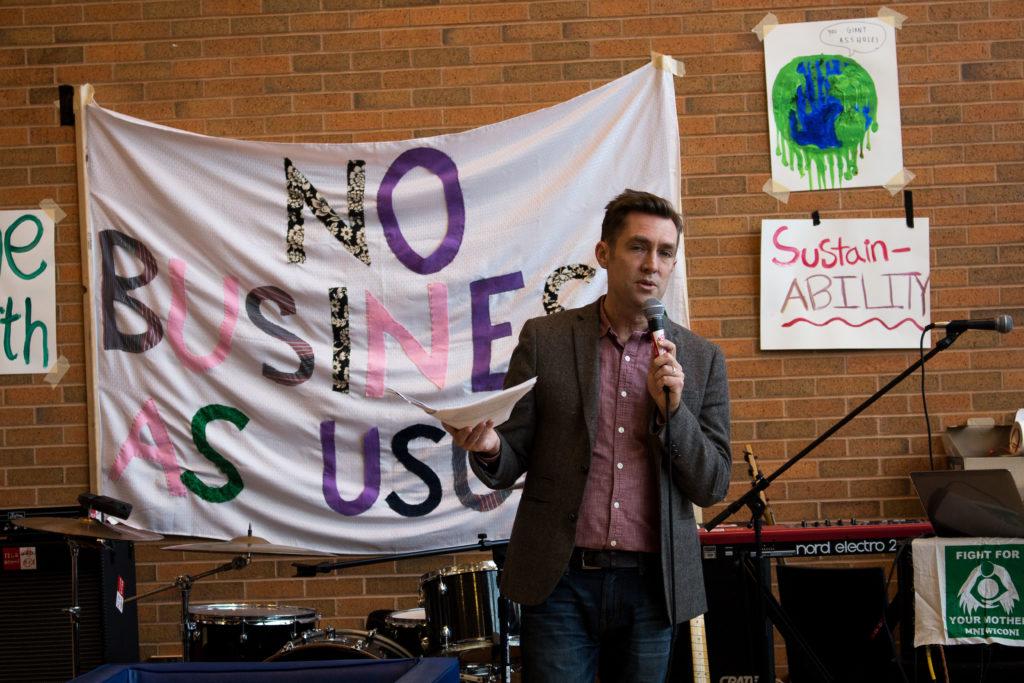
As the Board of Trustees held their third round of discussions on the possibility of Grinnell College divesting from fossil fuels on Monday, Nov. 6, student activist coalition Grinnell Student Resistance held a coinciding day of action.
Leading up to the Grinnell Student Resistance programming on Monday, the student activists undertook a week of visual activism around campus, which consisted of various art installations and informational signage related to the impact of global warming.
“[The goal of the visual campaign] was to bring attention to the student body, to remind them that this issue is ongoing and that this is the time to take a stand,” said Evan Feldberg-Bannatyne ’20, a member of Grinnell Student Resistance. “We had coal piles and the facts and the oil spills out front of the JRC. We did handprints in charcoal, all sorts of good stuff.”
Feldberg-Bannatyne explained his involvement in the divestment campaign and described his concerns about the College’s investments in fossil fuels.
“People are dying right here right now abroad and in the United States as a direct result of fossil fuels. These are finite resources and we can’t exploit them forever. Coal is dead, so why do we have $11.4 million invested in coal? It doesn’t make any sense. There are lots of companies that are very profitable that are sustainable energy programs. I think it makes a lot of financial sense to divest because when this bubble bursts, stocks are going to crash, and that could leave the College in trouble,” he said.
Following the visual campaign, on Monday Grinnell Student Resistance ran nine and a half hours of action. These events coincided with presentations coordinated by the trustees’ Fossil Fuels and Climate Impact Task Force. From 12 p.m. until 3 p.m. in the Spencer Grill, student bands played music and Grinnell Student Resistance provided art supplies so that students could create activist art.
Next, at 3 p.m., the task force held community conversations in which students discussed the issues of divestment and the College’s climate impact with trustees. At a dialogue moderated by Professor Tim Dobe, religious studies, the conversation turned to Grinnell’s decision decades ago to divest from South African companies during the apartheid era, under the belief that to stay invested would be “morally reprehensible.” Then, in Faulconer Gallery, Rabbi Rob Cabelli led a spiritual and moral contemplation of divestment. His talk was centered on how to make a difference when one feels powerless and how to foster conversation without power dynamics getting in the way.
“Not any single college is going to solve [the problem of climate change], but that has never been a reason to stop doing the right thing,” Cabelli said.
Next on the docket was a rally in the Grill, wherein students engaged in chants, such as “Hey, get off it! The enemy is profit. Climate devastation will not be stopped by corporations,” and “One, we are the students. Two, we have the power. Three, we want divestment for our future.” Student musicians played along. Students whose lives have been directly impacted by climate change then gave testimonies about their experiences. One student spoke of the impact that fracking had had on their community: the town’s drinking water was polluted to the point that residents could light it on fire.
“I’m getting chills just thinking about [the testimonies]. It was really powerful,” said Morgane Garnier ’19, a leader of Grinnell Student Resistance who played a part in organizing the Day of Action.
At 6:30 p.m., student activists set up in the top floor of the Dining Hall to host “D-Hall-Ogues.”
“We intercepted the advisory committee and trustees to ask them to join us in dialogue thinking about shareholder activism, climate change and divestment as a social issue, and how it relates to our commitment to social justice as a college,” Garnier said. The night concluded as students had coffee with trustees, engaging further in dialogue around divestment.
Garnier viewed the day of action as a success.
“I was really impressed with how many people turned up to the D-Hall-Ogues. I think that was really great and the trustees really got the message that we care as a student body. … And I’m amazed at how many first-years came, and people who I didn’t really expect to be there. So I’m appreciative of that.”
Come April, trustees will vote on whether or not to divest. In the meantime, there is no doubt that Grinnell Student Resistance ensured that concerned students’ voices could be heard.























































